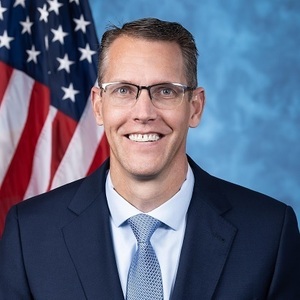Feenstra introduces 3 bills to boost research for biobased fuels

Rep. Randy Feenstra, R-Iowa
February 22, 2023
BY Erin Krueger
Rep. Randy Feenstra, R-Iowa, in February reintroduced three bills that aim to support the U.S. biofuels industry by comparing the costs of electric vehicle (EVs) and flex fuel vehicle (FFVs) fleets, supporting research and development for sustainable aviation fuel (SAF), and supporting the development of biofuel fuel cells. All three bills were previously introduced during the 117th Congress.
The Comparison of Sustainable Transportation (COST) Act, or H.R. 912, was introduced on Feb. 9 and referred to the Committee on Oversight and Accountability and the Committee on Energy and Commerce. The bill directs the U.S. comptroller general and the secretary of energy to compare the financial and environmental costs of replacing federal government gasoline-powered vehicles with EVs or E85-capable FFVs. The secretary of energy would be required to report findings to the House Committee on Science, Space and Technology. To date, Reps. Mike Bost, R-Ill.; Mike Flood, R-Neb.; Ashley Hinson, R-Iowa; Brad Finstad, R-Minn.; and Mariannettee Miller-Meeks, R-Iowa, have signed on to cosponsor the COST Act.
Feenstra also introduced the Biojet Fuel Research Act, or H.R. 909, on Feb. 9. Following its introduction, the bill was referred to the House Committee on Science, Space and Technology. The Biojet Fuel Research Act directs the Federal Aviation Administration to establish a working group focused on identifying research and development needs to produce biojet fuel. The working group would include representatives of the U.S. Department of Energy’s Bioenergy Technologies Office, the USDA, biorefinery stakeholders, agriculture research universities, and others. The working group would be required to submit its findings to the House Committee on Science, Space and Technology. To date, Bost, Flood, Miller-Meeks and Rep. Zachary Nunn, R-Iowa, have signed on to cosponsor the biojet bill.
Advertisement
Advertisement
In addition, Feenstra introduced the Biofuel Cell Research Act, or H.R. 910, on Feb. 9. That bill was also referred to the House Committee on Science, Space and Technology. The legislation directs the DOE to establish a research, development and demonstration program for a commercially viable fuel cell system that uses biofuels as the main fuel source. The DOE would also be directed to work with the USDA, U.S. Department of Transportation and appropriate stakeholders to establish research and development goals that would result in the demonstration of the fuel ell system. To date, Flood, Finstad and Miller-Meeks have signed on to cosponsor the bill.
The Iowa Renewable Fuels Association, Growth Energy and Green Plains Inc. have issued statements in support of the three bills.
"There is no doubt in our mind that over the next decade low carbon biofuels will out preform electric vehicles if judged by sound science. Unfortunately, we repeatedly see policy makers put their fingers on the scales,” said Monte Shaw, executive director of the IRFA. “Rep. Feenstra’s biofuels bills will help ensure the competition is on a level, scientifically-based playing field. Hailing from the most renewable congressional district in the country, Rep. Feenstra has quickly established himself as a leader for renewable fuels in Congress. IRFA members thank Rep. Feenstra for his constant efforts to promote home-grown, lower-cost biofuels.”
“Green Plains applauds Congressman Feenstra for his continued support of Iowa agriculture and our ever-evolving bio-economy,” said Todd Becker, president and CEO of Green Plains. “As Green Plains transforms our biorefinery platform, new markets, such as alcohol-to-jet sustainable aviation fuel, are key for our low-carbon ethanol. The Biojet Fuel Research Act can help spur the advancement of these innovative technologies and keep Iowa at the forefront of the transportation fuel revolution.”
Advertisement
Advertisement
“Each of these bills would bolster the innovation that’s already taking place at bioprocessing facilities around the country,” said Emily Skor, CEO of Growth Energy. “The U.S. ethanol industry is laser focused on investing in new technologies and new products, all with an eye toward lowering carbon emissions and decarbonizing the transportation sector. Rep. Feenstra’s proposals would focus the federal government’s attention on the same efforts with the same goals. We applaud the introduction of each of these bills and hope to see them quickly taken up and moved forward with bipartisan support.”
Related Stories
The U.S. Energy Information Administration maintained its forecast for 2025 and 2026 biodiesel, renewable diesel and sustainable aviation fuel (SAF) production in its latest Short-Term Energy Outlook, released July 8.
XCF Global Inc. on July 10 shared its strategic plan to invest close to $1 billion in developing a network of SAF production facilities, expanding its U.S. footprint, and advancing its international growth strategy.
U.S. fuel ethanol capacity fell slightly in April, while biodiesel and renewable diesel capacity held steady, according to data released by the U.S. EIA on June 30. Feedstock consumption was down when compared to the previous month.
XCF Global Inc. on July 8 provided a production update on its flagship New Rise Reno facility, underscoring that the plant has successfully produced SAF, renewable diesel, and renewable naphtha during its initial ramp-up.
The U.S. EPA on July 8 hosted virtual public hearing to gather input on the agency’s recently released proposed rule to set 2026 and 2027 RFS RVOs. Members of the biofuel industry were among those to offer testimony during the event.
Upcoming Events










